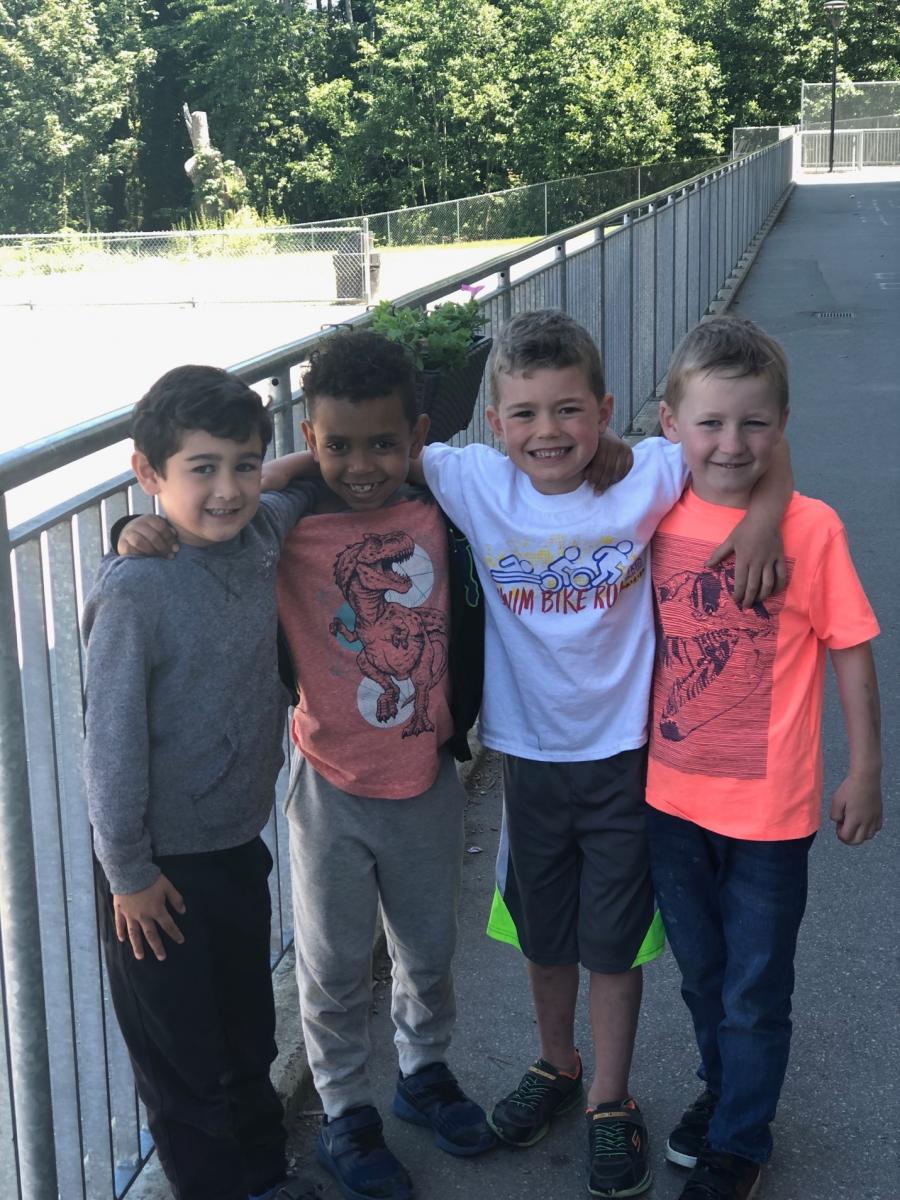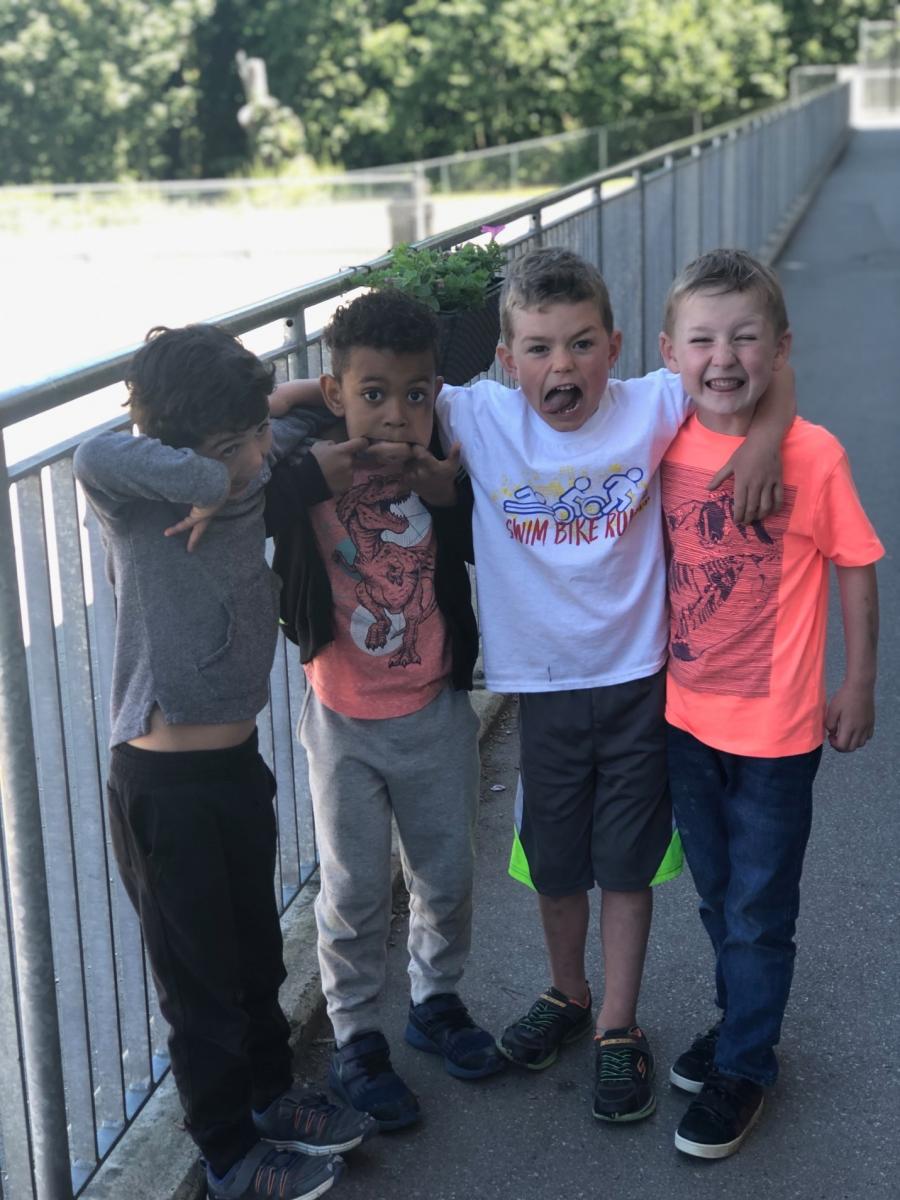Illustration Elements
Illustration Éléments
Context
Four boys started school not knowing each other and quickly became inseparable friends. One of the boys emerged as the “leader” of the group and the others began to call him “The Boss.” The relationship quickly turned to a leader/follower relationship with the leader sometimes leading the boys in unkind directions.
The followers were soon tattling on each other for using inappropriate language and behavior. The boys could not answer a question in class without first looking to “The Boss” to tell them how to answer. They would always follow each other at free choice time. If one on the boys tried to make choices independent of the group, he would be told that he wasn’t allowed to play with other kids and that they wouldn’t be his friend anymore if he did. They would then proceed to chase the boy all recess, so he couldn’t play with anyone else.
Evidence of their growing personal and social competence is provided through teacher reflection and interviews with the four students.
Illustration
Teacher Reflection
Through a lot of talk about positive friendships, appropriate boundaries and making good choices, the boys have started to understand what it means to have someone support you in positive ways. They are beginning to separate into groups of two and play at different activities. The families have started to arrange playdates on weekends to further facilitate healthy friendships outside of school.
The biggest difference has been an ongoing conversation about what it means to be brave. How do we show bravery in friendships? Why is it important to be brave and tell others what you need in friendships? How does being brave make you feel about yourself?
For example: When asked where he was going to play during centres, one student looked around for “The Boss” and when he saw him at the House Centre, he said that he wanted to go there. When the teacher asked where he wanted to play, he responded, “Well, I want to go to Lego, but I have to go to house.” The teacher told him to go where he wanted to go and to do what was right for his own learning. The boy decided to play at the Lego Centre. In the following days, the boys began to split off and play at other centres. Another one of the boys said, “I am going to be brave and do what is right for me.”
Slowly, the boys are starting to think for themselves. When asked which students in the class are positive learning partners for them, none of the boys said each other. They described each other as good playground friends but chose other friends to play with in the classroom. Progress!
Student Interviews
Interview with K
Teacher: Tell me about your friendship with the other boys.
K: We knew ourselves before kindergarten.
Teacher: What do you like about your friendship?
K: They support me.
Teacher: What are you working on in your friendship?
K: Trying to make good choices. That means to play with different friends sometimes because sometimes they run away from me and that makes me feel sad.
Teacher: Why is it important to be brave in your friendship?
K: Because you can change your plan. If your plan was to play with T and K and if they said, “no”, then I say, “Okay, could we play at lunch or at recess?”
Teacher: Tell me how you are brave enough to tell your friends what you need in your friendship?
K: I say, “Don’t talk to me. Maybe later.” I say that when they are talking to me at the carpet and I am trying to listen.
Teacher: Why are you proud of yourself?
K: Because I make good choices.
Interview with J
Teacher: Tell me about your friendship with the other boys.
J: My friendship with T is him coming to my house and having moving night. T said that me met K first and then me and then E and that’s how he got a group but when we are split up into groups of two, we be nice.
Teacher: What do you like about your friendship?
J: We like to spend time together outside in the grass field. If we have a jacket, we just relax on the jacket and we hold our hands together.
Teacher: What are you working on in your friendship?
J: We work on E and my book. We are working on being nice. To say good things to people.
Teacher: Why is it important to be brave in your friendship?
J: By working together to fight animals that try and attack us. We know that friends shouldn’t make another guy say things.
Teacher: Tell me how you are brave enough to tell your friends what you need in your friendship?
J: I had to tell them that I needed support. I needed support to help me to make good choices.
Teacher: Why are you proud of yourself?
J: I am proud of myself because I make good choices.
Interview with E
Teacher: Tell me about your friendship with the other boys.
E: We like to play at recess. We like to play on the gravel field and also, we like go on top of the hill at the gravel field. We just run down and roll down the hill.
Teacher: What do you like about your friendship?
E: They always do fun things and I don’t want to miss out on it.
Teacher: What are you working on in your friendship?
E: We want to smile at each other.
Teacher: Why is it important to be brave in your friendship?
E: Um, because you have to do that to have good friends. Like to play nicely with your friends. You need to be brave because if they are being mean to somebody, you can tell a supervisor. That is hard sometimes.
Teacher: Tell me how you are brave enough to tell your friends what you need in your friendship?
E: Actually, at none parts of the day I need be brave. I just like to do what they like to do. If they are doing something I don’t like then you can just get a new friend.
Teacher: Why are you proud of yourself?
E: because, um, you can be a really good friend or a really bad friend. I am a good friend because I like to play with them and support them.
Interview with T
Teacher: Tell me about your friendship with the other boys.
T: I like to play with them outside and be together and I like to have fun with them.
Teacher: What do you like about your friendship?
T: Sometimes I play with them and sometimes I play with other people. Like I make with new friends with B and R.
Teacher: What are you working on in your friendship?
T: Listening. We are working on being better learning partners and listening to the teacher when we are together.
Teacher: Why is it important to be brave in your friendship?
T: Um, to make good choices for me.
Teacher: Tell me how you are brave enough to tell your friends what you need in your friendship?
T: I am brave to, if somebody is doing something bad then I can tell them to stop.
Teacher: Why are you proud of yourself?
T: I am proud because I treat people respectfully. I think I did something on accident before to hurt someone’s feelings but then I say sorry.
In familiar settings, I can interact with others and my surroundings respectfully.
I can build relationships and work and play cooperatively. I can participate in activities to care for and improve my social and physical surroundings. I use materials respectfully. I can solve some problems myself and ask for help when I need it. I listen to others’ ideas and concerns. I can be part of a group and invite others to join. I can identify when something is unfair to me or others.
I can initiate actions that bring me joy and satisfaction and recognize that I play a role in my well-being.
I can seek out experiences that make me feel happy and proud. I can express my wants and needs and celebrate my efforts and accomplishments. I have some strategies that help me recognize and manage my feelings and emotions. I recognize and can explain my role in learning activities and explorations, and I give some evidence of my learning. I can describe how some specific choices can affect my well-being and participate in activities that support my well-being.
I can make choices that help me meet my wants and needs and increase my feelings of well-being. I take responsibility for my actions.
I can take action toward meeting my own wants and needs and finding joy and satisfaction, and work towards a goal or solving a problem. I can use strategies that increase my feeling of well-being and help me manage my feelings and emotions. I can connect my actions with both positive and negative consequences and try to make adjustments; I accept feedback. I make decisions about my activities and take some responsibility for my physical and emotional well-being.

